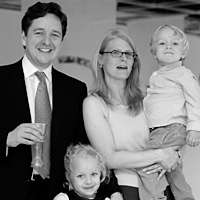| |
 |
| |
Thomas
Kolaja '96, with wife Lisa, daughter Madeleine and son
Jonas |
| |
|
Alumni
Profile: Thomas Kolaja '96
Kellogg
grad helped create new economic mindset in post-Communist
Poland
By
Ed Finkel
In
his early 20s, Thomas Kolaja fell into an exciting but daunting
opportunity as a Fulbright Scholar in Warsaw, where he proposed
researching how a new law permitting joint ventures between
Polish and foreign companies was affecting the chemical industry.
Upon
arriving in September 1990, about a year after the Berlin
Wall came down, Kolaja, a 1996 graduate of the Kellogg School's
Master of Management in Manufacturing program, discovered
that the University of Warsaw professor with whom he was supposed
to work suddenly had taken advantage of an opportunity to
spend a year in the United States — leaving the young
student without a supervisor or project.
The
university was unable to help him, so Kolaja networked with
other "Fulbrighters" and was referred to the newly
formed Ministry of Ownership Transformation, which was privatizing
some 8,000 formerly state-owned enterprises.
"The
average age of the staff was 25, and half the people there
had parachuted in from the U.S. or Western Europe to help
with the huge task," Kolaja says. "I asked if I
could interview the folks working on the privatization of
the chemical industry, or possibly even work with them since
I had funding for the year and not much to do. I was told
that no one was working on the chemical industry privatization,
and that if I wanted to, I could run it."
Although
Kolaja feels lucky for "being in the right place at the
right time," the challenges were hardly enviable. "We
were doing something that had never been done before,"
he says. "The economy was crashing as market forces took
hold, financial data didn't make any sense since there was
hyper-inflation, and no one could quite decide [on] which
privatization methodology" to use. Several were employed
simultaneously.
Among
the successes Kolaja helped to engineer were the sales of
the chocolate factory Wedel to Pepsi, a "huge" paper
mill in Kwidzyn to International Paper, along with a bevy
of detergent factories, gas producers, breweries and other
industries.
"All
of these companies have become leaders in their segments and
are still very strong today," he says. "The other
interesting thing is that the experience gave birth to the
private equity market in Poland. Most of my colleagues from
those days at the Ministry now run the major private equity
funds in Poland."
But
Kolaja's career took a different turn, in the direction of
consulting giant McKinsey & Co., where he joined a five-person
office in 1993 and helped to establish management consulting
as a viable field in Eastern Europe.
"My
career has involved spending a lot of effort to convince people
to do things they have never heard of before," he says.
"Back at the Ministry, we had to help people envision
what it would be like to work for a private company and get
them to agree to being owned by foreign capital. At McKinsey,
we convinced people that paying huge amounts of money for
ideas, rather than physical goods, was actually in their best
interest.
"It
was a pioneering time, because the advisory market was quite
new, and no one in Poland had ever paid for the kinds of services
we wanted to provide."
But
the outpost office gradually built its reputation, first with
Western clients who wanted to enter the market and then with
Polish banks. During his McKinsey tenure, Kolaja returned
to the states to attend the Kellogg School's MMM program.
For
most of the years since, he has been a partner at CII Group
— a 35-person firm recently renamed Kolaja and Partners
— where he joined former McKinsey colleagues in restructuring
large manufacturing companies. He has served in a series of
senior interim roles for clients, including COO of the largest
paper mill in Poland for Anglo American, CEO of the country's
largest Internet holding company, and vice president of operations
for Carlsberg Okocim, the country's third-largest brewer.
The
firm has decided to move away from pure advisory services
and focus on restructuring firms through interim management,
a task for which Kolaja says his Kellogg education has prepared
him.
"The
MMM program has been very useful in providing a number of
the tools we use," he says.
|





